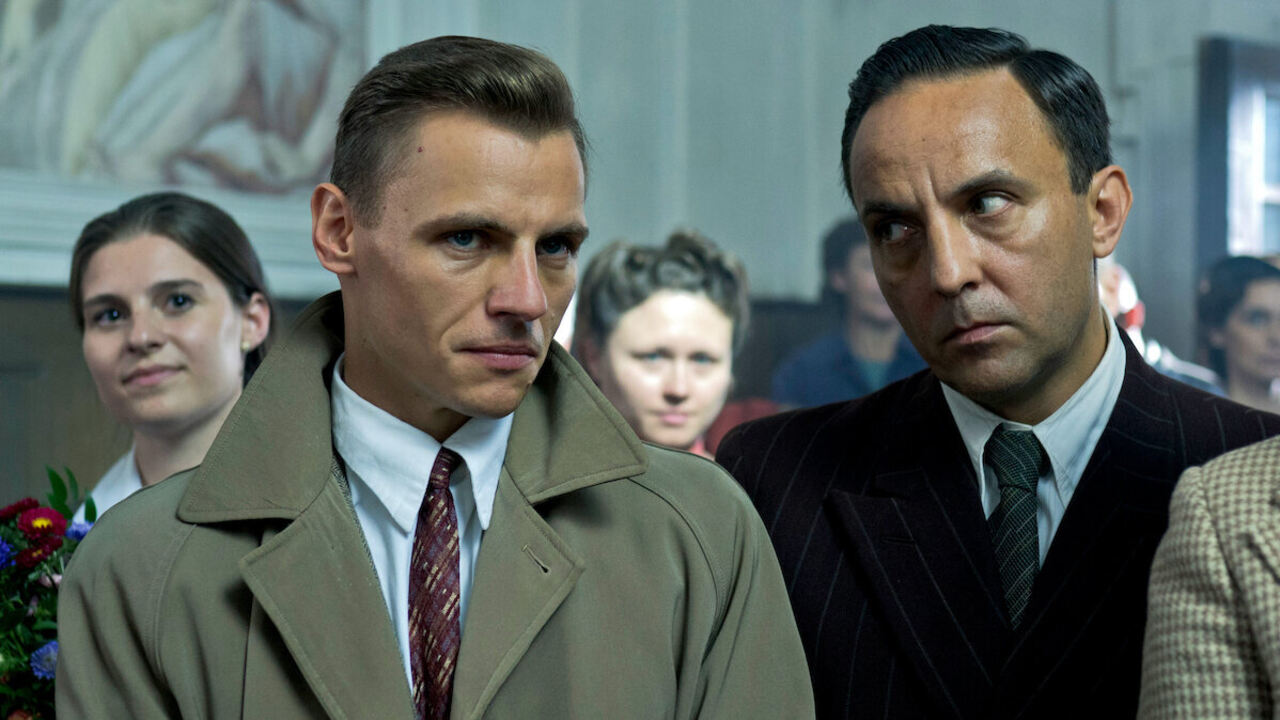
Pretty images don't necessarily make a film good, but they do end up relaxing your eyes. So what if nothing on the screen is working? You can at least spend your time feasting on prepossessing sights. No such luck, unfortunately, can be found in Pilecki's Report, written and directed by Krzysztof Lukaszewicz. The night scenes are so dim you start looking around for a torch or a searchlight. Since bright white lights come in through the windows, the indoors look murky. You often struggle to have a clear look at the faces of the characters on the screen. If Lukaszewicz, with cinematographer Arkadiusz Tomiak, wanted to accentuate the bleakness of the situation through these muddy images, then he failed in his mission spectacularly because the movie merely looks dirty. Only some brief moments that we see between Witold Pilecki (Przemyslaw Wyszynski) and Maria Pilecka (Paulina Chapko) are displayed clearly and brightly.
I started the review by talking about the images because they immediately detach you from the film. You become restless within the first few minutes and wait for the story to draw you in. However, even in this respect, Pilecki's Report disappoints the audience. The constant back-and-forth structure doesn't build suspense or intrigue. It further baffles the mind. There is no rhythm in the shift between the past and present timeline. The movie derives its flow from Witold's confession, but the confessions are depicted quite literally. His recollections are shown with texts containing the dates of the mentioned events, and the events themselves are reduced to a bunch of short bullet points. When Witold talks about destroying nine German tanks near Tomaszów Mazowiecki in September 1939, we observe him walking in the trenches, talking briefly about the ongoing situation and placing his gun at the required position before shouting, "Wait for my order!" What happened next, how exactly the tanks were destroyed, and what strategy the men used for the fight are all the questions the film doesn't bother answering. In another scene, we notice Witold and Maria arriving at a party, where we merely watch Maria dancing for a few seconds with some man before the movie decides to cut to another scene. Before the cut, Maria is seen looking at something. What is it? The movie doesn't inform the audience.
Pilecki's Report renders Witold's life dull and hectic. It tells its story without any dramatic beat or a sense of curiosity. Lukaszewicz's direction is so bland you are never sure how to react to the film. Some scenes, like the one where Maria meets Witold in jail and the latter's execution in the end, are meant to be emotional and heartbreaking. But you don't feel the sting. Lukaszewicz has taken a sad, powerful, important subject and created an impersonal film. The actors, too, are nothing more than okayish, so nobody manages to suck you in. Lukaszewicz doesn't allow his actors to express themselves freely. He confines them to the words and emotions of the script. Pilecki's Report looks alive when it concentrates on torture scenes. The killings are depicted with an intense brutality that makes you wince. One starts suspecting that Lukaszewicz made the movie solely for these murder scenes. He only seems adept at shocking the audience through acts of barbarity. At 1 hour and 58 minutes, Pilecki's Report leaves you exhausted, so much so that you eagerly await the end credits. If the victims wait for the torture to end, the audience waits for Pilecki's Report to reach the finish line. This is the only feeling (wanting something unpleasant to finish) that connects us to the characters of this film.
Final Score- [3.5/10]
Reviewed by - Vikas Yadav
Follow @vikasonorous on Twitter
Publisher at Midgard Times
Hi Everyone, after a due consideration, we have decided that we will be open for donations to help us in managing our website. We will be greatful for any kind of amount we receive. Thanks!
— Midgard Times 🎬 (@Moviesr_net) January 4, 2026
PayPal- [email protected] pic.twitter.com/DlNNz5Npm5
Get all latest content delivered to your email a few times a month.
Bringing Pop Culture News from Every Realm, Get All the Latest Movie, TV News, Reviews & Trailers
Got Any questions? Drop an email to [email protected]